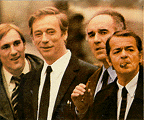Somewhere between the idealism of youth and the nostalgia of old age lies regret, and it is at this life’s juncture that we find three lifelong friends in Claude Sautet’s poignant film, Vincent, François, Paul and the Others. Every Sunday, friends and family congregate at Paul (Serge Reggiani) and Julia’s (Antonella Lualdi) house in the country, where they leisurely dine, walk through the fields, play sports, and above all, enjoy each other’s company. Paul is a writer whose dreams of authoring a literary novel remain elusive, and instead finds himself collaborating on human interest stories. Vincent (Yves Montand), the owner of a precision machine shop, has mortgaged his business in order to acquire new equipment, and is in danger of bankruptcy. François (Michel Piccoli) has a thriving medical practice in the city, and seeks refuge from his troubled marriage to Lucie (Marie Dubois) by immersing himself in his work.
Vincent has been separated from his wife Catherine (Stephane Audran) for two years, and one day, at the country house, she telephones him to ask for a divorce. It is an unexpected turn of events for Vincent, who, despite his open affair with a younger woman, clearly still loves her and is deeply affected by her decision to end their marriage. When an unexpected financial crisis arises, Vincent and his protégé, Jean (Gerard Depardieu), a struggling boxer, visit the creditors in an unsuccessful attempt to postpone payment. With no one left to turn to, Vincent visits Catherine for comfort and reassurance. Inevitably, Vincent realizes that his business problems are unimportant. The more pressing issue is how to win back the alienated affections of a woman whom he had deeply hurt.
Similar to Vincent and Catherine, François is equally burdened with the knowledge of a failing marriage. Looking out from the window of his examination room, François watches with wounded, resigned detachment as his wife Lucie meets with one of her nameless lovers in front of their house for an appointed rendezvous. Despite the humiliation, François still finds their tenuous relationship to be a consolatory alternative to being alone. However, the growing distance between François and Lucie proves to be irreparable. Gradually, François retreats into an unspoken emotional isolation.
At the core of the film lies in the unresolved nature of relationships. In Un Coeur en Hiver, personal inhibition and fear of rejection prevent the characters from validating their palpable emotional connection. Similarly, Vincent finds himself unable to express his regret at losing Catherine. In an understated, yet shattering scene, Vincent attempts to reconcile with Catherine at a cafe: he nervously looks down, fumbles with his glass and cigarette, trivializes his failed business. But inevitably, he can only look away and drink in silence. Vincent, François, Paul and the Others is an astute commentary on the spectrum of human emotion – a profound, yet deceptively lyrical portrait of failed dreams and loves, longing and regret, friendship and loneliness.
© Acquarello 2000. All rights reserved.
